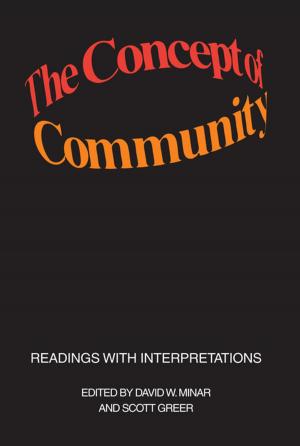Undertones of Insurrection
Music and Cultural Politics in the Modern German Narrative
Fiction & Literature, Literary Theory & Criticism, Nonfiction, Religion & Spirituality, Philosophy| Author: | Marc Weiner | ISBN: | 9781351300704 |
| Publisher: | Taylor and Francis | Publication: | September 29, 2017 |
| Imprint: | Routledge | Language: | English |
| Author: | Marc Weiner |
| ISBN: | 9781351300704 |
| Publisher: | Taylor and Francis |
| Publication: | September 29, 2017 |
| Imprint: | Routledge |
| Language: | English |
A basic tenet of literary studies is that aesthetic structures are politically significant because they represent an artist's response to the political implications of cultural codes with which the recipient of the modern work is also acquainted. This tenet provides the basis for the ideological associations attending the appearance of music in the modern German narrative. With his understanding of the arts as involved in often unacknowledged ideological forces within a culture, Marc Weiner's Undertones of Insurrection bridges the gap between the "New Musicology's" rewarding infusion of modern cultural and literary theory into the study of music, politically insightful examinations of narrative structures in the modern novel, and the methodologically conservative area of musical-literary relations in Germanic Studies. In other words, the questions it raises are different from those pursued in most examinations of music and literature, because previous works of this kind concerning the literature of German-speaking Europe have often disregarded social concerns in general, and political issues in particular.Ranging from 1900 to Doctor Faustus (1947), Weiner study sets the stage by examining public debates that conflated such issues as national identity, racism, populism, the role of the sexes, and xenophobia with musical texts. In the literary analyses that follow, Weiner discusses both obvious connections between music and sociopolitical issues--Hesse's equation of jazz and insurrection in Steppenwolf--and covert ones, the suppression of music in Death in Venice and the use of politically charged musical subtexts in Werfel's Verdi and Schnitzler's Rhapsody. By uncovering the ideological agendas informing cultural practice in modernist Germany, Undertones of Insurrection calls for a reevaluation of the function of music in the modern German narrative.
A basic tenet of literary studies is that aesthetic structures are politically significant because they represent an artist's response to the political implications of cultural codes with which the recipient of the modern work is also acquainted. This tenet provides the basis for the ideological associations attending the appearance of music in the modern German narrative. With his understanding of the arts as involved in often unacknowledged ideological forces within a culture, Marc Weiner's Undertones of Insurrection bridges the gap between the "New Musicology's" rewarding infusion of modern cultural and literary theory into the study of music, politically insightful examinations of narrative structures in the modern novel, and the methodologically conservative area of musical-literary relations in Germanic Studies. In other words, the questions it raises are different from those pursued in most examinations of music and literature, because previous works of this kind concerning the literature of German-speaking Europe have often disregarded social concerns in general, and political issues in particular.Ranging from 1900 to Doctor Faustus (1947), Weiner study sets the stage by examining public debates that conflated such issues as national identity, racism, populism, the role of the sexes, and xenophobia with musical texts. In the literary analyses that follow, Weiner discusses both obvious connections between music and sociopolitical issues--Hesse's equation of jazz and insurrection in Steppenwolf--and covert ones, the suppression of music in Death in Venice and the use of politically charged musical subtexts in Werfel's Verdi and Schnitzler's Rhapsody. By uncovering the ideological agendas informing cultural practice in modernist Germany, Undertones of Insurrection calls for a reevaluation of the function of music in the modern German narrative.















